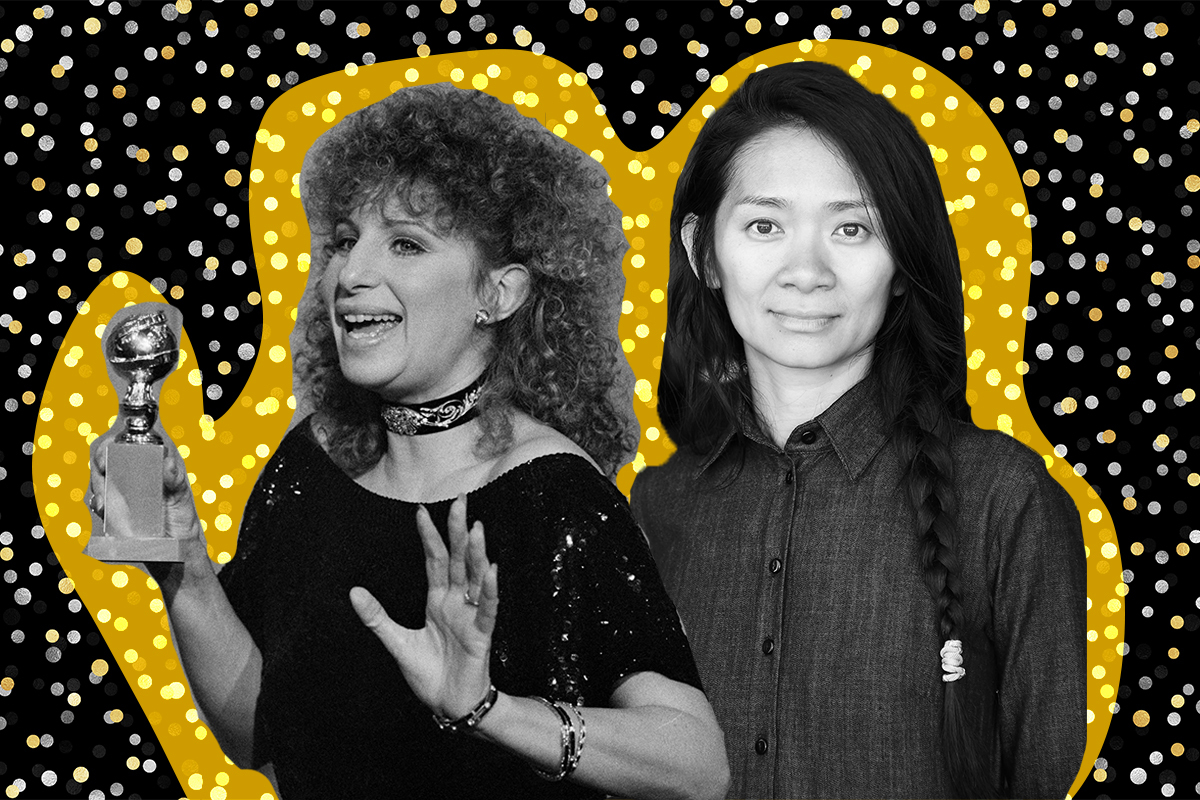Last night, Chloe Zhao made history as the first woman of color and first Asian woman ever to win Best Director at the Golden Globes for the intimate, grounded Nomadland, in which Frances McDormand heads a cast of mostly non-actors portraying elements of their real lives. “I especially want to thank the nomads who shared their stories with us,” Zhao said in her acceptance speech, before quoting one of them, Bob Wells: “’Compassion is the breakdown of all the barriers between us. A heart to heart bonding. Your pain is my pain, is mingled and shared between us.’ Movies… give us a chance to laugh and cry together, to learn from each other.”
This year’s directing nominees included an unprecedented three woman, including two women of color: Zhao, who is Chinese; Black director Regina King for One Night in Miami; and English director Emerald Fennell for Promising Young Woman. Before this year, no woman had won the Best Director title at the Globes for 37 years.
And who was the last woman to win? Barbra Streisand, for Yentl, in 1984.
Though Streisand and Zhao’s differences are obvious, from their backgrounds to their cinematic and personal styles (Zhao is soft-spoken and identifies herself as a wanderer, and Barbra is… well, Barbra), they possess key similarities that have enabled their work to shine in a landscape that hasn’t always welcomed women into the ranks of power. They both have a clarity of vision, a determination, and a sense of their own worth in the face of major studios.
The Hollywood Reporter caught up with Streisand after these historic nominations. Reflecting on Yentl after almost four decades, she had this to say:
“I’ve always thought women are intrinsically powerful. And some men still don’t want the competition. Thirty-seven years ago, the industry was mostly run by men. Directors were mostly men. It’s taken years for women to accept their own power and say, ‘I can do this!’ Initially, I was looking for someone else to direct Yentl, until I realized that none of the men I approached had as strong a vision of this movie as I did. So I took the chance.”
This reminded me of the way Zhao has talked about her next film, Marvel’s Eternals. It represents a major shift in scope from the personal, spare films for which she’s known. But she seems to have approached the process with the same integrity and focus that has guided her on budgets a fraction of the size: “They knew from the moment I pitched the film that I really wanted the scope and scale at the same time as the intimacy, they knew I wanted both,” she said in an interview with ScreenRant.
Streisand and Zhao both took pride in their historic victories, while acknowledging that they should have come sooner. “I’m sure there are many others before me who deserved the recognition,” Zhao said in a Variety interview after her win. Streisand nodded to other female-led films in recent years that haven’t received the recognition they perhaps deserved: “There were wonderful movies in the last few years directed by women. Queen & Slim, Little Women, Mudbound, Wonder Woman, The Nightingale. And they were all overlooked. So it’s really gratifying to see these three very distinctive films made by incredibly talented women nominated.” When asked how Hollywood has made progress on empowering female directors in the 37 years since her historic win, Streisand replied, succinctly, “Very slowly.”
But both women also looked optimistically towards the future, expressing hope that they’d be the first of many. In her 1984 acceptance speech, Streisand said, “I’m very proud because it also represents, I hope, new opportunities for so many talented women to try to make their dreams become realities, as I did.” And reflecting on her win, Zhao said, “I just love what I do, I really love it, and if this means that more people like me get to live their dream and do what I do, I’m happy.”
In a year that has seen an uptick in anti-Asian American hate crimes, this win for Zhao feels even more poignant. When asked about how representation matters in a hostile landscape, Zhao said, “When we look in each other’s eyes and stare at the other person, we can’t deny them as a human being. Maybe we need to be a bit more compassionate to ourselves. People with so much hate… maybe they just hate themselves. Try to see the world from the other person’s perspective… it’s the only way we can survive as a species.”
Congratulations, Chloe Zhao. Imagining a victory call between you and Babs makes me very happy. Celebratory Nomadland-Yentl double feature, anyone?



